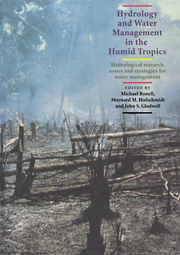 Hydrology and Water Management in the Humid Tropics
Hydrology and Water Management in the Humid Tropics Published online by Cambridge University Press: 23 December 2009
ABSTRACT
The paper presents the author's personal philosophy of hydrological methodology. It claims that the latter is biased toward mechanistic reductionism and an exaggerated orientation towards short-term technological solutions to water-related problems arising in the temperate climatic zone. It suggests that this bias stands out most clearly against the background of the specific natural conditions of the humid tropics. In this context, three aspects are emphasized as deserving major attention in the development of an adequate scientific basis for the hydrology of the region and for addressing its long-term environmental and water resource problems. These aspects are: 1) non- stationarity of the major geo- and biophysical/chemical processes, 2) a dynamically sound macrohydrology, and 3) quantitative eco-hydrology (i.e. the soil-vegetation-atmosphere interactions as mediated by energy and water).
A HISTORICAL PERSPECTIVE
Hydrology, as most everyone knows, is the science dealing with the dynamics of the hydrological cycle, i.e., with the circulation of water on planet Earth. Not everybody realizes, however, that this dictionary definition is more a statement of a program than a statement of fact. Hydrology has never been practised in a global water context. Such an approach has only recently been contemplated as feasible, and, indeed, as necessary. In spite of this realization, it is by no means clear how such a program can be executed or how much integration is desirable and necessary among the historically-formed autonomous sciences of oceanography, climatology, meteorology and atmospheric physics, glaciology, hydrogeology, and the hydrology of the land surface, i.e., hydrology in the narrow sense.
To save this book to your Kindle, first ensure [email protected] is added to your Approved Personal Document E-mail List under your Personal Document Settings on the Manage Your Content and Devices page of your Amazon account. Then enter the ‘name’ part of your Kindle email address below. Find out more about saving to your Kindle.
Note you can select to save to either the @free.kindle.com or @kindle.com variations. ‘@free.kindle.com’ emails are free but can only be saved to your device when it is connected to wi-fi. ‘@kindle.com’ emails can be delivered even when you are not connected to wi-fi, but note that service fees apply.
Find out more about the Kindle Personal Document Service.
To save content items to your account, please confirm that you agree to abide by our usage policies. If this is the first time you use this feature, you will be asked to authorise Cambridge Core to connect with your account. Find out more about saving content to Dropbox.
To save content items to your account, please confirm that you agree to abide by our usage policies. If this is the first time you use this feature, you will be asked to authorise Cambridge Core to connect with your account. Find out more about saving content to Google Drive.